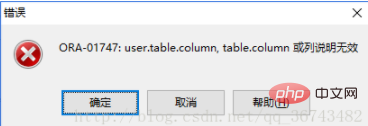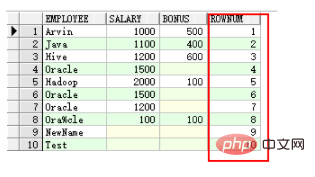What is the usage of rownum in oracle
In Oracle, rownum is a virtual column introduced by Oracle. It is only constructed when querying. It is used to limit the total number of rows returned by the query and assign the number of rows returned from the query. The number always starts from 1. By analogy, rownum cannot be prefixed with the name of any table.

The operating environment of this tutorial: Windows 10 system, Oracle 11g version, Dell G3 computer.
What is the usage of rownum in Oracle
For rownum, it is the number that the Oracle system sequentially assigns to the rows returned from the query. The first row returned is assigned 1, and the second Rows are 2, and so on. This pseudo field can be used to limit the total number of rows returned by the query, and rownum cannot be prefixed with the name of any table.
rownum is a virtual column introduced by Oracle.
This virtual column does not exist physically, it is only constructed during query. Pseudo columns are usually freely allocated and cannot be modified by users.
Features
There are the following main features about rownum:
1) rownum does not belong to any table.
2) The premise for the existence of rownum is the result table first.
3) rownum always starts from 1.
4) rownum is generally only used with
5) Using rownum for paging query requires converting rownum into a real column and querying against rownum.
2. Mechanism principle
The usage of rownum may seem strange, but in fact it will be very simple if you understand its mechanism principle.
First we do a simple experiment: take out all the fields from the dual table and take out the rownum.
If we use the following writing method: t.rownum

When running in this way, a 01747 error will be reported:

Because in fact, the rownum field does not exist in the dual table, so we cannot use the t.rownum format.
The correct way to write it should be:

So, rownum is a virtual column and does not belong to any table.
So where did this virtual column come from. We are doing a simple experiment for easy understanding:
As follows, we have a simple table: test_ljb, with a total of ten records.
We add rownum.
The results are as follows, easy to understand, select ten records, rownum is from 1 to 10

We add a salary filter condition:

The results are as follows: three records are selected, rownum is from 1 to 3

It should be noted that the second result table The employee corresponding to the rownum does not correspond to the first one.
For example: when the rownum of the first table is 1, it corresponds to Arvin, and the second table corresponds to Oracle.
The reasons are as follows:
Because rownum is a pseudo column added to the result set, that is, a column that is added after the result set is found first.
Simply put, rownum is the sequence number of the results that meet the conditions. It always starts from 1, so it is impossible for the selected result to skip 1 and have other values greater than 1.
In other words, rownum is dynamic and changes in real time according to the new result set.
Recommended tutorial: "Oracle Tutorial"
The above is the detailed content of What is the usage of rownum in oracle. For more information, please follow other related articles on the PHP Chinese website!

Hot AI Tools

Undresser.AI Undress
AI-powered app for creating realistic nude photos

AI Clothes Remover
Online AI tool for removing clothes from photos.

Undress AI Tool
Undress images for free

Clothoff.io
AI clothes remover

AI Hentai Generator
Generate AI Hentai for free.

Hot Article

Hot Tools

Notepad++7.3.1
Easy-to-use and free code editor

SublimeText3 Chinese version
Chinese version, very easy to use

Zend Studio 13.0.1
Powerful PHP integrated development environment

Dreamweaver CS6
Visual web development tools

SublimeText3 Mac version
God-level code editing software (SublimeText3)

Hot Topics
 1386
1386
 52
52
 How to check tablespace size of oracle
Apr 11, 2025 pm 08:15 PM
How to check tablespace size of oracle
Apr 11, 2025 pm 08:15 PM
To query the Oracle tablespace size, follow the following steps: Determine the tablespace name by running the query: SELECT tablespace_name FROM dba_tablespaces; Query the tablespace size by running the query: SELECT sum(bytes) AS total_size, sum(bytes_free) AS available_space, sum(bytes) - sum(bytes_free) AS used_space FROM dba_data_files WHERE tablespace_
 How to encrypt oracle view
Apr 11, 2025 pm 08:30 PM
How to encrypt oracle view
Apr 11, 2025 pm 08:30 PM
Oracle View Encryption allows you to encrypt data in the view, thereby enhancing the security of sensitive information. The steps include: 1) creating the master encryption key (MEk); 2) creating an encrypted view, specifying the view and MEk to be encrypted; 3) authorizing users to access the encrypted view. How encrypted views work: When a user querys for an encrypted view, Oracle uses MEk to decrypt data, ensuring that only authorized users can access readable data.
 How to view instance name of oracle
Apr 11, 2025 pm 08:18 PM
How to view instance name of oracle
Apr 11, 2025 pm 08:18 PM
There are three ways to view instance names in Oracle: use the "sqlplus" and "select instance_name from v$instance;" commands on the command line. Use the "show instance_name;" command in SQL*Plus. Check environment variables (ORACLE_SID on Linux) through the operating system's Task Manager, Oracle Enterprise Manager, or through the operating system.
 How to uninstall Oracle installation failed
Apr 11, 2025 pm 08:24 PM
How to uninstall Oracle installation failed
Apr 11, 2025 pm 08:24 PM
Uninstall method for Oracle installation failure: Close Oracle service, delete Oracle program files and registry keys, uninstall Oracle environment variables, and restart the computer. If the uninstall fails, you can uninstall manually using the Oracle Universal Uninstall Tool.
 How to solve the problem of closing oracle cursor
Apr 11, 2025 pm 10:18 PM
How to solve the problem of closing oracle cursor
Apr 11, 2025 pm 10:18 PM
The method to solve the Oracle cursor closure problem includes: explicitly closing the cursor using the CLOSE statement. Declare the cursor in the FOR UPDATE clause so that it automatically closes after the scope is ended. Declare the cursor in the USING clause so that it automatically closes when the associated PL/SQL variable is closed. Use exception handling to ensure that the cursor is closed in any exception situation. Use the connection pool to automatically close the cursor. Disable automatic submission and delay cursor closing.
 How to check invalid numbers of oracle
Apr 11, 2025 pm 08:27 PM
How to check invalid numbers of oracle
Apr 11, 2025 pm 08:27 PM
Oracle Invalid numeric errors may be caused by data type mismatch, numeric overflow, data conversion errors, or data corruption. Troubleshooting steps include checking data types, detecting digital overflows, checking data conversions, checking data corruption, and exploring other possible solutions such as configuring the NLS_NUMERIC_CHARACTERS parameter and enabling data verification logging.
 How to delete all data from oracle
Apr 11, 2025 pm 08:36 PM
How to delete all data from oracle
Apr 11, 2025 pm 08:36 PM
Deleting all data in Oracle requires the following steps: 1. Establish a connection; 2. Disable foreign key constraints; 3. Delete table data; 4. Submit transactions; 5. Enable foreign key constraints (optional). Be sure to back up the database before execution to prevent data loss.
 How to create cursors in oracle loop
Apr 12, 2025 am 06:18 AM
How to create cursors in oracle loop
Apr 12, 2025 am 06:18 AM
In Oracle, the FOR LOOP loop can create cursors dynamically. The steps are: 1. Define the cursor type; 2. Create the loop; 3. Create the cursor dynamically; 4. Execute the cursor; 5. Close the cursor. Example: A cursor can be created cycle-by-circuit to display the names and salaries of the top 10 employees.




